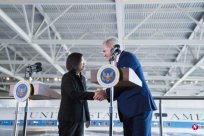US trade representative Dai Qi said that traditional cutting tariff methods are no longer suitable for the fierce global economy in the 21st century.In the past, trade agreements focused on "high liberalization and cancellation of tariffs", which made the United States and other countries rely too much on key materials, and also allowed Beijing to use non -market practices dominated by the country to dominate the world's key industries.
(Washington Composite Electric) U.S. trade representative Dai Qi defended the Bayeng government who did not seek to reach a traditional free trade agreement, saying that she worked hard to reduce the method of non -tariff barriers, to compete with workers, supply chains, and American competition between the United States and China.Ability is more beneficial.
Daiqi On Wednesday (April 5), in a policy speech at the Washington Law School of the University of America, called "Friend-SHORING" to create a supply chain between allies and reduce geopolitics such as China and other geographical politicsThe dependence of the opponent.
Daiqi said that she began to change the idea of leaders in Washington and other countries, that is, the traditional method of cutting tariffs, and no longer applicable to the fierce global economy in the 21st century.
She said that trade and industrial policies are inseparable, and the United States is using industrial policy to invest in infrastructure, semiconductor and clean energy technology.These incentive measures bring high salaries to employees including non -university graduates.She pointed out that the past trade agreements focused on "high liberalization and cancellation of tariffs," which made the United States and other countries too dependent on China in key materials, and at the same time allow Beijing to use non -market practices led by the country to lead the world's key industries.
Daiqi said that the government's approach must solve China's "economic businessism". By making strategic investment in China to better compete, and "strengthen cooperation with like -minded economies to create a more more for the peopleFair, more sustainable future. "
She said that this method is the basis of the Indian Pacific Economic Framework (IPEF) and the US -EU Trade and Technology Commission.They are not paying attention to tariffs, but regulatory, environment, food safety, labor and digital economy issues. These problems have proven to be a strong trade barrier.
Daiqi said that non -tariff negotiations in the US Trade Representative Office enabled the United States to export rice, wheat, corn, shellfish and beef to the European Union, exported pork and pecans to India, and exported beef and ethanol to Japan.
Last year, the export of agricultural products in the United States reached US $ 2020 billion (about S $ 268 billion). Daiqi attributed this part to the efforts of the US Trade Representative's Office. Although the Russian and Ukraine War caused a certain role in rising commodity prices.
Daiqi told reporters that it is difficult to explain why it is necessary to stop reaching a traditional practice of a free trade agreement.But people have begun to understand that they generally recognize that after the crown disease is popular, it is necessary to increase the toughness of the supply chain and reduce dependence on China."We need to do things in different ways, we are approaching consensus."


